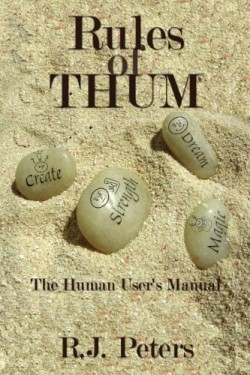Rules of THUM
The Human User's Manual
R. J. Peters is a “self-taught visionary” dedicated to his own self-awareness and to helping others grow. His current book is a compilation of his thoughts on what it takes to live a life that could be described as “happy.” Peters’ work has been published in technical magazines and he writes fiction and nonfiction for children and adults. Were his latest musings simply unpublished entries in a personal journal they would not demand editing proofreading and fact-checking but to publish them in need of this help detracts from the good counsel he offers.
Peters understands the need to reevaluate one’s thoughts and feelings in order to get a fresh start in life as well as the need to obtain and absorb new understanding as one matures; he recognizes that one cannot build a better self on “false concepts and negative thoughts.” His conversational style leads readers to consider questions like “What do you want to be when you grow up?” and “Is there a devil?” and to explore concepts like karmic debt (nagging undone tasks) forgiveness (a “master approach” to getting rid of baggage) and loss and mortality (“From the moment you were conceived you have set into motion a cacophony of losses that will ultimately end with your death”).
Managing to find the positive even in difficult lessons without minimizing their difficulty Peters confronts them head-on and asks readers to do the same using the energy of such events as opportunities to grow and change. He suggests adopting “an attitude of gratitude” toward losses and releasing others and oneself from blame since all will experience problems in life and “releasing blame allows for added energy to deal with them.” Such counsel is wise indeed and all too rarely followed in these litigious times.
The author has obviously absorbed much wisdom and his effort to share it with others is to be commended but collaboration with skillful editors and proofreaders would help him present his ideas more clearly and with greater precision. Misuse of common words hinders understanding and may even allow for undesired interpretations as in this line: “Create fortune for yourself by learning the laws that govern us and coveting the devils that you would destroy.” The word covet is defined as “to desire inordinately or without due regard for the rights of others; desire wrongfully” (Webster). Although one may be grateful in time for lessons learned from one’s “devils” and facing one’s fears allows progress to occur a more judicious choice of words would clarify the author’s intent.
The Human User’s Manual takes universal themes and treats them in a manner not unlike a conversation between friends over coffee or a glass of good wine; it makes light-hearted easy reading of even the most challenging subjects. The author’s message that “Every manifest moment is an opportunity to change your life for the better” is valid; help from others who could make his presentation more polished and his concepts more readily understood would greatly enhance this needed message.
Disclosure: This article is not an endorsement, but a review. The publisher of this book provided free copies of the book and paid a small fee to have their book reviewed by a professional reviewer. Foreword Reviews and Clarion Reviews make no guarantee that the publisher will receive a positive review. Foreword Magazine, Inc. is disclosing this in accordance with the Federal Trade Commission’s 16 CFR, Part 255.

